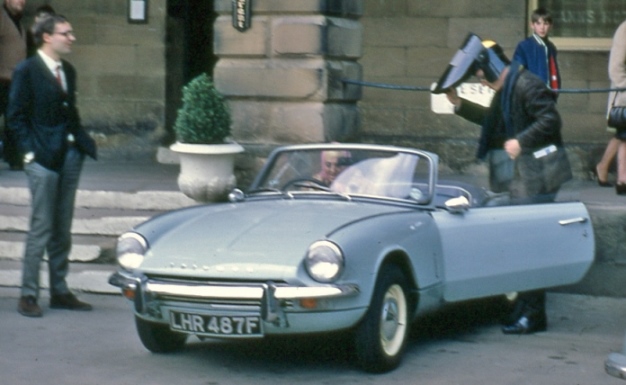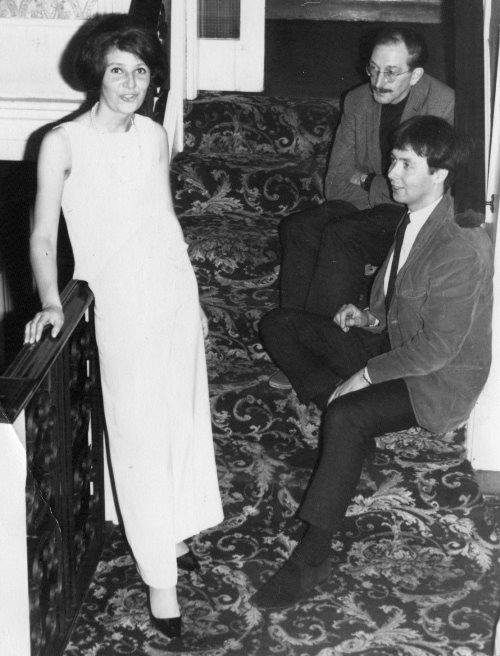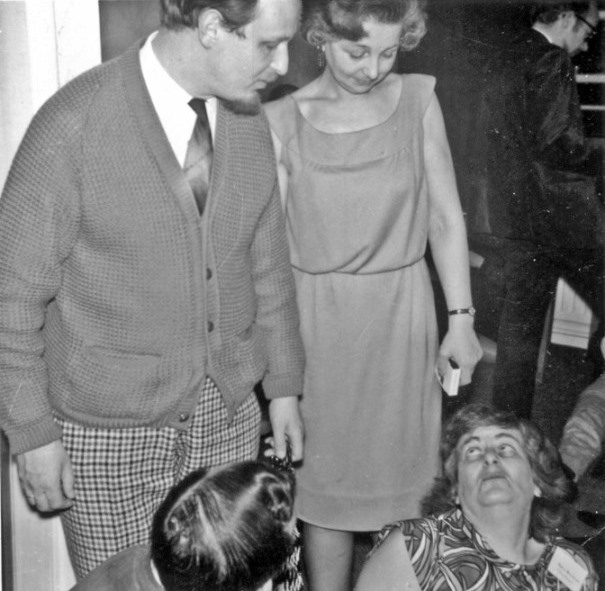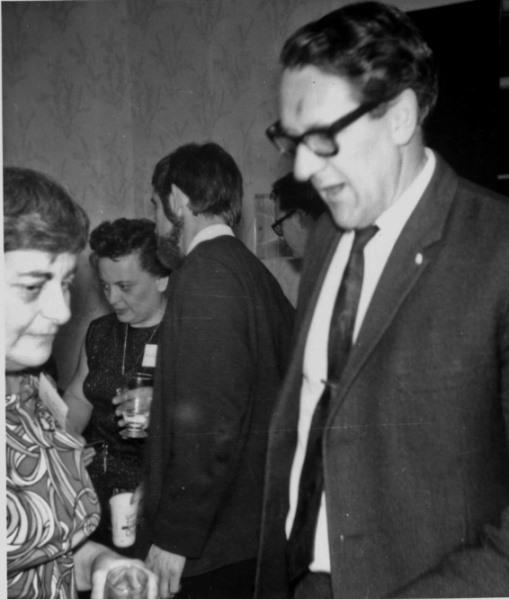Saturday 25th MarchDARROLL PARDOE:Saturday morning I breakfasted in the company of Roje Gilbert, Barbara Mace and Brenda Piper, then adjourned to the con hall for the pro panel, which consisted of John Brunner, Judy Merril, James White, Mike Moorcock and Tom Disch. [And Brian Aldiss.]
PETER WESTON: The programme was stronger this year, with a good number of professionals present, including visiting writers Judith Merril and Tom Disch. Six of them were rounded up on Saturday morning for a panel discussion in which they fielded incriminating questions such as "What Hack Novels Have You Written?" Guest-of-Honour John Brunner led off, blithely ignoring the question completely and talking instead about the way he began writing. "I started telling stories at boarding school after lights out," he said. "By the time I left I had a very good idea of how to tell a story. I had no experience of the outside world but this didn't stop me writing. Science fiction is a good way of writing without showing your lack of experience." Brian Aldiss endorsed these sentiments, though perhaps slightly ironically.
"If you really have done nothing and know nothing, then certainly you should write science fiction. My first novel was actually written fairly directly from life, and was about bookselling. Since then I have presumably done less and know less, and have been writing SF ever since. Like John, I really began my career after lights out at boarding school. They did not allow talking, and the master on duty would listen at a grille. If he heard voices he would burst in and ask, 'Who is talking?' and I would put my hand up, to be dragged off and beaten. It was my first form of payment, my introduction to anal erotic literature." I decided to go along to my display stand in the book-room for a while, to see if anyone was interested in Speculation. That's when I had my big shock. In the opposite corner, my old adversary Graham Hall had set up shop on a table and he was completely surrounded with people. I went over and found he was selling a completely new fanzine, something I had never seen before, or even heard about. It was titled AUSTRALIAN SCIENCE FICTION REVIEW, and I looked at it with incredulity. Graham noticed my interest and smirked. "Nyah-nyah-di-nyah-nyah," he hooted. "This is better than your fanzine, Weston!" I flung him some money and took a copy away to study further. It was a special issue (number 7 1/2) produced by the enterprising Australians for our convention, with a long article on J. G. Ballard and comments by people like John Carnell and Mike Moorcock. With a sick feeling I realised Graham was right, it was considerably better than SPECULATION. BRIAN ALDISS (letter to ASFR editor John Bangsund): You may not realize it, but you have established ASFR already as the sort of magazine in which one likes to say something. Margaret and I have just returned from the Bristol SF Convention, and one or two people there were making just that point. Graham Hall was one, I seem to recall. Your man Mervyn was there, by the way; an extremely interesting chap who seemed to enjoy himself in a relaxed way throughout, and who gave us first hand news of all you people whom we hear about and don't meet. PETER WESTON: It was all very discouraging and I went off to the bar to drown my sorrows. Fortunately, I bumped into Gerry and Anne along the way, who tried to lift my spirits. "Anne's just had a new car," Gerry said. "It's a Spitfire. Why don't you two go for a run in it?"
Half-an-hour later I felt a lot more cheerful, bowling along in bright sunshine in a gleaming open-top sports-car, glamorous blonde by my side, as we shot across the new Severn Bridge and into Wales. The Spitfire wasn't an easy car to drive; very hard suspension and fierce clutch pedal, but it had a lot more "poke" than my wheezy old Ford Popular, and I enjoyed the experience immensely. We drove all the way to Chepstow, nearly fifty miles. By the time we got back to the hotel, just in time for the screening of Ed Emshwiller's "experimental" half-hour film, Relativity. Tony Walsh warned us that it was not for the squeamish, that it was "bloody, very bloody," and that those who didn't like that sort of thing had better leave. He was right. TONY WALSH: Some of the best moments of the con stemmed from the incredible Relativity. But it also gave me a couple of bad moments. I had hired it because it WAS made by Emsh. That's all. It was an unknown quantity otherwise, despite the warning announcement I made about bloody scenes; that was on the advice of John Brunner and I had no real idea of what was coming. So, when the pig-slaughtering scenes came on I was suddenly aware children were still in the hall. I felt nervous and very uncertain, waiting for childish shrieks of terror and parental screams of wrath. None came and I relaxed again. Then came the sexy bit (wasn't she?) and I felt even more unsafe. I prayed that the manager would not walk in for I was certain he'd have me arrested for showing Blue Films. Despite these moments I enjoyed the thing. It was an experience I'm glad of. PETER WESTON: Some of the early scenes showed the slaughtering and gutting of a pig, its intestines slipping out, and immediately afterwards cut to packets of sausages in a supermarket. Then there was a long sequence, much appreciated by the men in the audience, in which the camera caressed a spectacular, nude female body, intimately and at length. Then-shock, horror - a mighty phallus thrust out of the screen, right at us! The film went on like this for another twenty minutes, leaving us in stunned silence. Well, not quite; in some of the scenes a man wearing what looked like white long johns was seen shifting from one foot to another while humming a few bars of a catchy little tune, repeated over and over. For the rest of the weekend fans would lurch and hum as they walked through the lobby or stood at the bar, entrapped by the best mind-block since The Demolished Man! What to make of it? I was baffled, but was fascinated to hear the film being explained at length by a newcomer, someone I didn't recognise. The name on his badge was Tony Sudbery, and I sidled over and introduced myself. He was a student at York, and yes, he had heard of SPECULATION, would be happy to write a review of the film. We went into the bar and I bought the drinks as Tony carried on with his complicated explanation.
CHUCK PARTINGTON (or BILL BURNS): Although for direction, camerawork, and editing the film was first-class, there were certain aspects of Relativity that were pornographic. This film was definitely not suitable for the mixed audience of adults and children usually present at a con. Tony Walsh's hurried apology immediately after the film reflected the general feelings of the audience. Due to the demands of a certain small section of the audience, the film was shown again late Sunday evening after the last official programme item. Tony admitted later that no one on the concom had seen Relativity previously, which in this case proved to be a bad mistake. PETER WESTON: I know of at least one amusing side-effect resulting from the film; In some of the scenes, a man wearing what looked like white underwear was seen shifting from one foot to another while, humming a catchy little tune. For the rest of the weekend afterwards, the occasional fan would be caught red-faced, humming and swaying as he crossed the road, stood at the bar, or walked through the lobby. For a few days after the con it looked as if this new habit would prove permanent! BILL BURNS: I can still hum the little tune from Relativity 58 years later, having not seen the film in the interim. If you want to hear it yourself, the film can be viewed here (33 minutes) and the tune begins just before 24 minutes in.
MERVYN BARRETT: The British Fantasy Awards were handed out that afternoon. Philip K. Dick's THREE STIGMATA OF PALMER ELDRITCH got one, and Mike Moorcock got one for his valiant efforts on behalf of sf in keeping the NEW WORLDS flag flying. Then they introduced the Guest of Honour, John Brunner. John sat and gave a lucid, carefully prepared, two part talk. The first part of it - given while I was still making some, feeble attempts at note taking - was concerned with the unauthorized and unpardonable mucking around with the words of writers that some American publishers indulge in. He cited one of his own books THE PRODUCTIONS OF TIME, which had really been given the treatment (I forget if it was fifty alterations in the first page or the first chapter but anyway it was a hell of a lot) and suggested that his readers wait and buy the Penguin edition. The second part of his talk dealt with the idea that an awful lot of writers seem to be rather 19th-century in their choice of story themes, and not really aware of the possibilities of story lines that can be developed out of the immediate future. I think... I do remember (such is my talent for concerning myself with trivia while failing to grasp the important points) that at two or three well-timed intervals in his talk he threw in a "shit" metaphor to make sure we'd keep paying attention, but he needn't have bothered: his material was so well organized and presented that he had his audience with him all the way.
PETER WESTON: In spite of its length it managed to keep its audience, despite the hot afternoon. John was especially enraged at some sub-editor who had played about with his latest novel. "How many unwarranted, unnecessary - actively detrimental - changes do you think Charlie Ignoramus can cram into the opening chapter?" he asked. And the answer was 55! Sufficient here to say that the audience was suitably sympathetic while suitably entertained.
Ordinary inhabitants of Bristol began to arrive in the convention hall after dinner, for the hotel management had organised its customary Saturday evening dance. Some of the braver fannish souls (he says, with considerable pride) ventured out on to the floor for a quick waltz or quickstep or whatever. Because the hotel had refused to cancel their regular Saturday-evening dinner dance this meant there was no Fancy Dress parade. Instead Tony Walsh moved everyone to a basement under the main hall for a cider-and-sherry party, although almost everybody was drinking beer. ETHEL LINDSAY: In the evening the convention committee threw a sherry party (Bristol is the home of sherry) at which Tom Schlück showed films taken on his TAFF-trip to the US. PETER WESTON: It was here that I became mixed up with Tony Walsh, Frank Herbert and Jim Marshall for a rather dirty little session during which my "brown paper parcel" story prompted a very gratifying reaction.
Most of my other special friends were at this party, including Gerry & Anne, Alex & Phyllis Eisenstein (who told me all about those many people in the USA whom I previously knew only through their letters); Dick & Diane Ellingsworth, and many others. In the middle of the evening Tony & Simone Walsh were pleased to be able to announce that convention memberships had passed the 200-mark, making Bristol in '67 perhaps the biggest-ever British annual convention. BRIAN HAMPTON: The next clear scene is set in the basement of the Hawthorns with a vast crowd of us sitting at the feet of Mary Reed. Yours truly produced his camera and a little diddy tripod which I sometimes use; there was a cry from Mary: "Oh, a phallic symbol!" She grabbed the tripod and started making pretty patterns with it and Arthur Cruttenden, who was sitting next door to her. MERVYN BARRETT: Now if, having read this far, you have come to the conclusion that the editor of ASFR might have looked a little further and bit more conscientiously for someone to cover this important sf event, then I can but say that I agree. It's all Royster's fault. He it was who wrote to me: "The lads at the Review are hoping that you'll be their legman at Bristol. A little ConRep, perhaps. Maybe a photo or two if you can get any..." I took the idea to heart immediately. Me! A Legman! (Actually I've always been rather more of a... but I'm getting away from the subject.) Not just another faceless fan, I would have Status. I would be able to walk up to the famous and say; "Look here, I'm from the Australian Science Fiction Review..." and that is just what I did, that night, at the Sherry and Cider party. I was received with courtesy and enthusiasm. No one said, "The what?" All had heard of it, and didn't mind admitting it. Some had actually read it. James White talked about it, and Judith Merril, obviously not wanting to run the risk of slighting the representative of a powerful pressure group within an emerging science fiction nation (but mostly I suspect because she is a super warm hearted person) invited me to the party in her room. DAV GARNETT: A few drinks later, it's evening. During the Brian Aldiss show, Charles Platt told how he'd sold Garbage World to Berkley (who also did Disch's first novel, The Genocides). Thinking of Brunner's speech, ask Platt whether he cares if the copy editor changes his book. He replies to the effect that they can do what they like. Confess I have writing ambitions and have had several New Worlds rejections. Maybe out of sympathy, he buys me a drink. At once Graham M. Hall and Christopher Priest join us. Two more famous New Worlds authors. I hope something will rub off.
Time to find a room party, they say. Rumour that there's one in 261. When we get there I realize it's my room. Doesn't seem to be a party, but Judith Merril is having one. Go there instead. Moorcock is playing guitar and singing. Merril locks the door "to keep the noise out", which at the time seems a perfectly valid reason. Whenever anyone else tries to get in, she tells them to go to room 261. Look around the room and remember my first thought on arriving: What am I doing here, I'm the only person I've never heard of. Sit on floor next to famous Tom Disch. He offers me a cigarette. Wonder if should take up smoking so can accept. Instead get him to autograph the packet: "Thomas M. Disch (The Famous)" it says. Merril complains that no one has asked her for her autograph, unlike at American cons. Ask Disch about this: he says he doesn't know, this is his first convention. Mine too. "I knew we must have something in common," he tells me. The drink flows like alcohol. MERVYN BARRETT: Someone had brought to the party a semi-transparent mask that had been bought that morning in Bristol. It was a female face and a lot of the women tried it on and they all looked horrifying and scary in it and we all went "oooh" and "ech" in appreciation of the effect. To nobody in particular I gave forth with my theory/observation that as soon as most people put a mask on they feel compelled to start acting out the character that the mask suggests. This idea of mine was recently stolen by a Japanese screen writer and used as the main theme of a movie called THE RACE OF ANOTHER. It's about the victim of an industrial accident who believes that his wife is rejecting him because of his disfigured face so has a lifelike plastic mask made so that he can pretend to be someone else and seduce her. The wife in this movie is played by Machiko Kyo, who becomes more and more beautiful with every movie she appears in.
For the greater part of the evening I sat at the feet of Brian Aldiss (he'd arrived early and got a chair), drinking Judy's brandy and in a fuzzy headed sort of way trying to figure out why he, a sincere and successful sf writer, should somehow seem to me to be just slightly out of place among sf fans. As if he had read my mind he quite casually started talking about his attitude towards certain areas of his existence, and his contacts with fans, in a way that illuminated the dark parts of the mystery which I sensed within him. I wish I could remember what he said....
| |||||||
|






